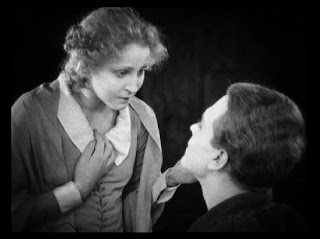Metropolis is the ultimate detective story.
Made in 1927 by the much lauded Fritz Lang, and only shown in its full length form for three months before being withdrawn in favour of a much shortened version, this movie, seen as the antecedent, both visually and for its character archetypes, for much of the science fiction cinema that followed including 2001 – A Space Odyssey (1968) and The Fifth Element (1997), was thought lost for much of the Twentieth Century, its artistic legacy gone forever. That was until the assembling in 2001 from film archives in cities as diverse as New York, London, Moscow and Canberra of much of its footage of a version of the film by the Friedrich-Wilhelm-Murnau Foundation which restored much of the film back to its former glory. Even so, the film was still missing about 25 minutes of its former running time, and so the restoration filled in the missing pieces with film stills, and plot synopses inserted in where the lost footage should have been,
Then in 2008, an astonishing discovery was made in Buenos Aires of the almost complete longer version of the film, which, while damaged in its transition to the 16mm format many years earlier, made it possible to restore the film to as close as we’re ever likely to get to its original form. Added to this joyous discovery was the fact that the original score by Gottfried Huppertz, in all its inspiring majesty, allowed the team to accurately piece the film together using the cues in the score along with excerpts from Huppertz’s journal.
 |
| The city in all it’s special effects glory |
 |
| Robotic Maria tempting and seducing the upper city’s decadent rich |
What we have now is a glorious experience – the reasonably complete version of the film, which details the struggles between the Haves (led by Jon Fredersen, played by Alfred Abel) who rule over the almost Utopian beauty of the upper city, and the Have Nots, who’s greatest champion is the feisty idealistic Maria (Brigitte Helm) who attracts the attention of the ruler’s son, Freder, who does everything he can to right the rampant injustices that underpin the lifestyle he enjoys. It is a story that on the surface looks to be simply about class warfare, and capitalism vs socialism. But if you look more closely, you realise that the vision of the screenwriter (and wife of Fritz Lang), Thea von Harbou, goes much deeper than this – mired in the decay and sense of futility of post World War 1 Weimar Germany (and a scant six years before Hitler’s rise to power in 1933), she seeks to explore the very nature of humanity, of the what drives people to do what they do, and the competing beliefs that compete for peoples’ attention when a society is in upheaval. With its themes of apocalypse, societal decay, and eventual triumph of the common good, the movie moves, often in a convoluted narrative fashion, to explore how a society can address the evils within itself, and the flawed nature of the people who make it up, and hopefully come out the other side, richer, and far more equitable and caring.
Coupled with the richness and power of Huppertz’s score, and the ground breaking visual imagery and special effects that was light years of it’s contemporaries, watching this movie is a privilege as your mind and soul, and yes, even your heart (a key recurring theme in the movie, where the heart is seen as the link between the mind and the hands of the Haves and Have Nots respectively) are engaged in a cinematic experience that goes back to an era where cinema actually said something worthwhile.
It is a joy that the movie is back to enthral the world, after a detective hunt, worthy of a film all its own, brought it back to stunning life, leaving us all the richer for it.

